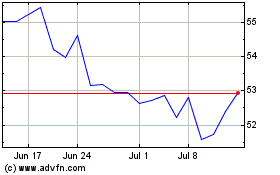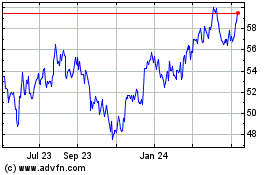Dow Chem Gains Ability to Convert Preferred Stock Held by Berkshire and Kuwait -- Update
December 15 2016 - 4:46PM
Dow Jones News
By David Benoit and Nicole Friedman
Dow Chemical Co. finally gained the right to convert $4 billion
of preferred stock into common shares, ridding the company of an
expensive burden and depriving Warren Buffett of another lucrative
crisis-era investment.
A recent rally in Dow stock on Thursday triggered a clause
allowing the chemical giant to convert the shares. That will enable
the company to start keeping $255 million it has been sending to
Mr. Buffet's Berkshire Hathaway Inc. every year, and another $85
million owed to Kuwait's sovereign-wealth fund, which owns $1
billion of the shares.
The Midland, Mich., company plans to call for the conversions
immediately, and should complete them over the next week or so,
people familiar with the matter said. They will hand Berkshire
roughly 6% of Dow's common stock, while Kuwait gets about 2%. It
isn't clear what the investors will do with the new shares, but Mr.
Buffett has indicated he's a seller.
Dow would have to pay out about $180 million a year in ordinary
dividends on the common stock, but investors and analysts have been
waiting eagerly for the conversion as the move is expected to free
up capital for other uses.
Dow sold the stakes in 2009 to help pay for its purchase of Rohm
& Haas Co., a roughly $15 billion deal struck in the summer of
2008 that was aimed at expanding the company's presence in
high-margin specialty chemicals. The deal soured when sales took a
hit from the financial crisis and the debt it added proved
burdensome. Dow had agreed to pay Mr. Buffett and the Kuwait
Investment Authority 8.5% interest, or a total of $340 million
annually. That's yielded Berkshire more than $1.5 billion -- or as
Mr. Buffett likes to say, $8 a second.
From 2008 to 2011, Berkshire shelled out roughly $25 billion for
preferred securities of Dow, Bank of America Corp., General
Electric Co., Goldman Sachs Group Inc., insurer Swiss Re and gum
maker Wm. Wrigley Jr. Co. In exchange for generous terms, the famed
investor would lend critical support for a company or a deal it was
trying to pull off. At the end of 2009, Berkshire held preferred
shares in five companies that paid an aggregate $2.1 billion a year
in dividends and interest.
"Berkshire was in effect, on the corporate side, the lender of
last resort in 08-09," said David Kass, a finance professor at the
University of Maryland's Robert H. Smith School of Business and a
Berkshire shareholder. "It certainly worked out well for
Berkshire."
It isn't hard to see why companies are eager to shed such
investments while Mr. Buffett is eager to hold on to them.
Swiss Re, GE and Goldman redeemed their preferred stock in 2010
and 2011, and Mars Inc. earlier this year bought Berkshire's stake
in Wrigley, which Mr. Buffett had helped the candy maker buy in
2008. Berkshire still holds preferred stock of Bank of America, a
$5 billion investment that came in 2011 as the bank grappled with
continued fallout from the financial crisis. Berkshire also holds
preferred stock in Burger King parent Restaurant Brands
International Inc., which it helped with financing the buyout of
coffee chain Tim Hortons Inc. in 2014.
Mr. Buffett has called the redemption of preferred shares
"decidedly negative."
Dow was able to force the conversion starting in April 2014 as
long as its stock closed above $53.72 in 20 of 30 trading days.
While the stock occasionally breached the figure, as it did last
December and this August, it never did so for long enough.
One Yale Law School professor studied the pattern and concluded
there was less than a one-in-a-thousand chance the stock's failure
to trip the trigger was random.
Dow itself has suspected someone was shorting the stock at
around $53 and keeping it from breaching the trigger level for long
enough, people familiar with the matter have said.
Under the original agreement, Berkshire was only forbidden from
engaging in short selling or hedging its preferred stake until
April 2014. Mr. Buffett has declined to comment on whether he or
his deputies were shorting Dow stock.
The company has said it had no evidence or knowledge Berkshire
was doing so.
Dow's earnings and margins have been improving and last year it
struck a landmark deal with rival DuPont Co. that would combine the
two and then break them into three new companies if regulators
approve.
Amid that and the powerful rally that followed the presidential
election, Dow stock has now finally stayed above the threshold for
20 days. Dow stock closed Thursday at $58.35, up just over 1% and
at an all-time closing high.
"Converting just in time for the holidays!" Wells Fargo analyst
Frank Mitsch wrote in a report this week, boosting his view on Dow
stock's worth to $66-$68. "We conclude that the conversion creates
material value through cash flow generation and opportunities for
investing or buying back shares."
The conversion will make Berkshire Dow's second-largest
common-stock holder behind index-fund giant Vanguard Group. But
that may not be the case for long.
"Would I rather own Dow...than any other stock?" Mr. Buffett
said on CNBC in February. "If that were the case then I would have
been buying it already."
Write to David Benoit at david.benoit@wsj.com and Nicole
Friedman at nicole.friedman@wsj.com
(END) Dow Jones Newswires
December 15, 2016 16:31 ET (21:31 GMT)
Copyright (c) 2016 Dow Jones & Company, Inc.
Dow (NYSE:DOW)
Historical Stock Chart
From Mar 2024 to Apr 2024

Dow (NYSE:DOW)
Historical Stock Chart
From Apr 2023 to Apr 2024
